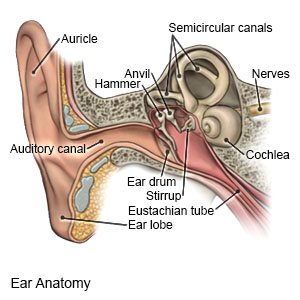Stapedectomy
Medically reviewed by Drugs.com. Last updated on May 6, 2024.
What do I need to know about a stapedectomy?
A stapedectomy is surgery to remove part or all of your stapes and replace it with a prosthesis. The stapes is a horseshoe-shaped bone in your middle ear. Stapedectomy is used to restore your hearing. Surgery is usually done on one ear at a time.
 |
How do I prepare for surgery?
Your healthcare provider will talk to you about how to prepare for surgery. You may be told not to eat or drink anything after midnight on the day of your surgery. Your provider will tell you which medicines to take or not take on the day of your surgery.
What will happen during surgery?
You may be given general anesthesia to keep you asleep and free from pain during surgery. You may instead be given local anesthesia to numb the surgery area. With local anesthesia, you may still feel pressure or pushing during surgery, but you will not feel any pain. Your surgeon will insert a small scope, or use a microscope and tools in your ear. A scope is a small tube with a light and camera on the end. Part or all of the stapes bone will be removed and replaced with a prosthesis. Your surgeon will secure the prosthesis and place gauze in your ear. Your ear may be covered with a bandage.
What are the risks of surgery?
You may bleed more than expected or get an infection. You may be dizzy for several days or weeks. You may have nausea or vomit. Your eardrum may tear. You may have weakness or not be able to move one side of your face. Your sense of taste may change, or you may lose taste on the side of your tongue. You may develop ringing in your ears. Your hearing may not improve with surgery, or it may get worse. In rare cases, you may lose your hearing completely.
Care Agreement
You have the right to help plan your care. Learn about your health condition and how it may be treated. Discuss treatment options with your healthcare providers to decide what care you want to receive. You always have the right to refuse treatment. The above information is an educational aid only. It is not intended as medical advice for individual conditions or treatments. Talk to your doctor, nurse or pharmacist before following any medical regimen to see if it is safe and effective for you.© Copyright Merative 2024 Information is for End User's use only and may not be sold, redistributed or otherwise used for commercial purposes.
Further information
Always consult your healthcare provider to ensure the information displayed on this page applies to your personal circumstances.
